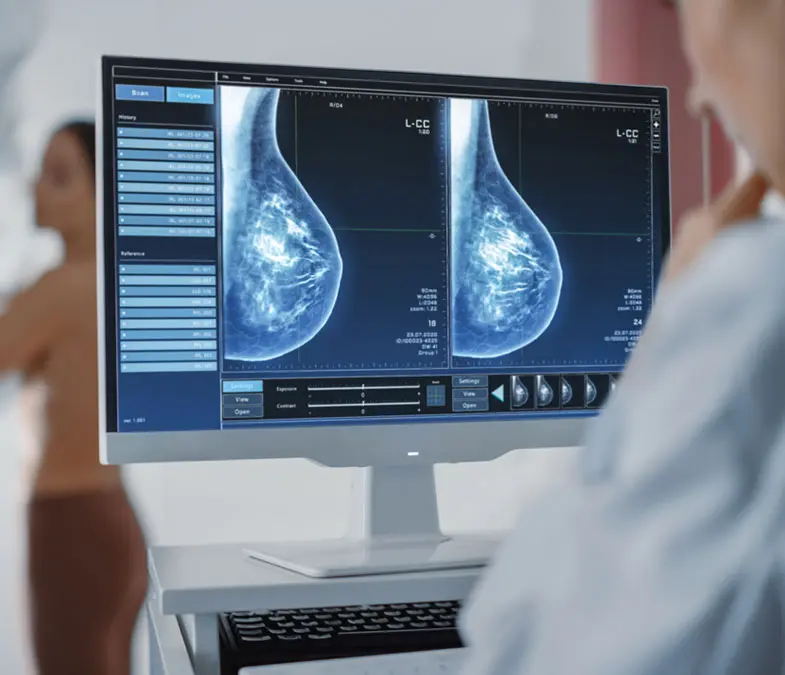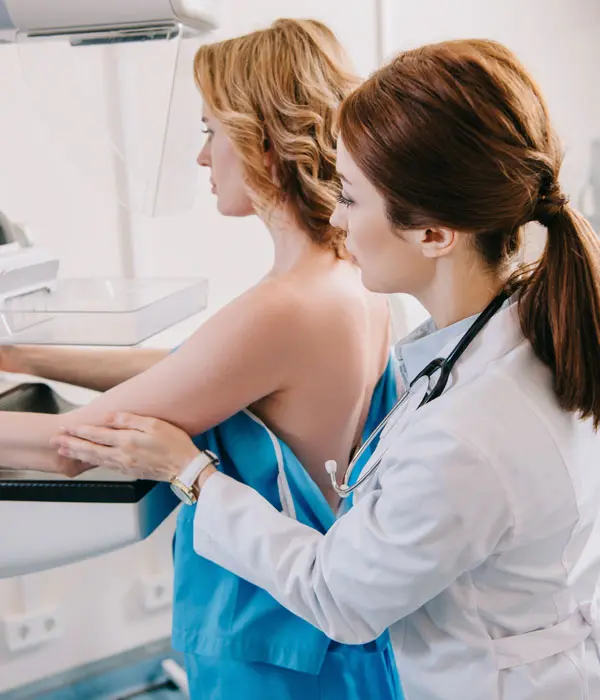Breast Cancer
Evolutions in Radiotherapy for Early Breast Cancer
Read moreConcerns - Breast Cancer

Breast screening at our clinics in Birmingham is a critical component of preventive healthcare, particularly for women, as it aims to detect breast cancer at an early stage when treatment is often more effective. At the Birmingham Breast Group, breast screening is conducted with utmost care and precision, utilising advanced technologies and a comprehensive approach to ensure your health and well-being.


The primary objective of breast screening is the early detection of breast cancer through various imaging techniques such as mammography, ultrasound, and magnetic resonance imaging (MRI). Mammography, in particular, is the most common method used for breast screening. It involves taking low-dose X-ray images of the breast tissue to identify any abnormalities, such as lumps or microcalcifications, that may indicate the presence of cancerous or precancerous cells. We can also use the mammographic density in calculating breast cancer risk.
At the Birmingham Breast Group, the screening process begins with a thorough assessment of the patient’s medical history and risk factors for breast cancer. This allows healthcare professionals to tailor the screening approach according to individual needs and circumstances. During the screening appointment, you are provided with information about the procedure and given the opportunity to ask any questions or address concerns you may have.
Once the mammography procedure is underway, highly trained radiographers ensure that the images obtained are of the highest quality, allowing for accurate interpretation by experienced breast radiologists. Our specialists carefully analyse the images to detect any abnormalities and determine whether further investigation or intervention is necessary.
Most women (96%) receive normal mammogram results. For 4%, further tests are needed to confirm the outcome, often due to technical issues like movement during the scan. Mammograms aren’t perfect, so additional tests help ensure accuracy. False positives, where initial results suggest a problem but further tests show normal results, aren’t uncommon. Of the 4% requiring more tests, only 1 in 100 is diagnosed with cancer. If further tests are needed, it’s a routine step to ensure accurate results.
In addition to mammography, other imaging modalities such as ultrasound and MRI may be employed in certain cases to provide additional information or clarify findings from mammographic images. Ultrasound uses sound waves to create images of the breast tissue and is particularly useful for evaluating lumps or abnormalities detected on mammograms. MRI, on the other hand, utilises magnetic fields and radio waves to generate detailed images of the breast, offering valuable insights, especially in cases where mammography or ultrasound results are inconclusive.
Mammograms will be offered to women aged 40 years and above. Women under this age will be offered an ultrasound as the breast tissue of a very young woman is very dense making it more challenging to interpret on mammography. If previous mammograms have been taken elsewhere, these may be imported for review to ensure there has been no interval change.
The NHS Breast Screening Programme (NHSBSP) was introduced in 1988 and invites all women aged 50-70 years to have mammograms every 3 years. Approximately 1.3 million women are screened annually to diagnose 10,000 cancers. The general uptake is around 75%.
The Birmingham Breast Group places a strong emphasis on the multidisciplinary approach to breast care, involving collaboration between radiologists, breast surgeons, oncologists, pathologists, and other specialists. This ensures that patients receive comprehensive and integrated care throughout the screening process and beyond, if further evaluation or treatment is required.
Breast screening plays a crucial role in improving survival rates and reducing mortality from breast cancer. Studies have shown that early detection through screening can lead to smaller tumour size at diagnosis, which is associated with better treatment outcomes and increased chances of successful treatment. Moreover, detecting breast cancer at an early stage may allow for less aggressive treatment options, reducing the physical and emotional burden on patients.
Beyond its impact on individual health outcomes, breast screening also has broader public health implications. By identifying breast cancer at an early stage, screening programs contribute to the overall reduction in the burden of the disease, leading to lower healthcare costs and improved quality of life for you and your family.
In conclusion, breast screening is a vital component of preventive healthcare, offering the opportunity for early detection and intervention in breast cancer. At the Birmingham Breast Group, screening is conducted with precision and compassion, utilising advanced technologies and a multidisciplinary approach to ensure the best possible outcome. By prioritising breast health and regular screening, you can take proactive steps towards maintaining your well-being and reducing the impact of breast cancer on your life.
Related Treatments
Related Concerns
KEEPING YOU UP TO DATE
Insights
View insights from our doctors and industry experts on a range of topics, along with tips and advice to keep you safe.
Our Locations
View all locationsAccreditations
Notifications